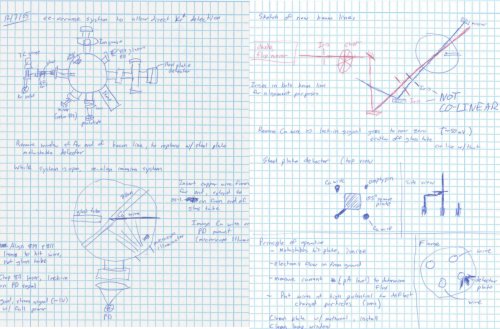In which we look at the end of the Steelypips era and the launch of ScienceBlogs. ———— Before the Great Upgrade derailed things completely for a month, I was working on a recap of this blog’s history, and had gotten up through the end of 2005, which marked the end of my time as an… Continue reading Ten Years Before the Blog: 2005-2006 (Part II, the Start of ScienceBlogs)
Tag: history
Quantum Man by Lawrence Krauss
While I’ve got a few more review copies backlogged around here, the next book review post is one that I actually paid for myself, Lawrence Krauss’s Quantum Man: Richard Feynman’s Life in Science, part of Norton’s Great Discoveries series of scientific biographies. I’m a fan of the series– past entries reviewed here include Richard Reeves’s… Continue reading Quantum Man by Lawrence Krauss
Heavy Heavy Water
I make an effort to say nice things about pop-science books that I read, whether for book research or blog reviews. Every now and then, though, I hit a book that has enough problems that I have a hard time taking anything positive from it. I got David Bodanis’s E=mc2: A Biography of the World’s… Continue reading Heavy Heavy Water
The Science Mindset List
It’s nearly time for classes to resume, which means it’s time for a zillion stories about Beloit College’s annual Kids These Days List, listing off a bunch of things that this year’s entering college class, who were mostly born in 1992, have always taken for granted. A sample: 1. Few in the class know how… Continue reading The Science Mindset List
1491 by Charles C. Mann
We picked up a used copy of Charles Mann’s pop-archeology book 1491: New Revelations of the Americas Before Columbus a while back. I didn’t read it at the time, because I was a little afraid that it would be rather polemical in what I think of as the Neil Young mode– wildly overstating the awesomeness… Continue reading 1491 by Charles C. Mann
Murphy Violation in Science
Over at Unqualified Offerings, Thoreau proposes an an experimental test of Murphy’s Law using the lottery. While amusing, it’s ultimately flawed– Murphy’s Law is something of the form: Anything that can go wrong, will. Accordingly, it can only properly be applied to situations in which there is a reasonable expectation of success, unless something goes… Continue reading Murphy Violation in Science
Cathedral-Building in Science
Tommaso Dorigo has an interesting post spinning off a description of the Hidden Dimensions program at the World Science Festival (don’t bother with the comments to Tommaso’s post, though). He quotes a bit in which Brian Greene and Shamit Kachru both admitted that they don’t expect to see experimental evidence of extra dimensions in their… Continue reading Cathedral-Building in Science
The Most Amazing Laser Application of All Time Is…
Voting has closed on the Laser Smackdown poll, with 772 people recording their opinion on the most amazing of the many things that have been done with lasers in the fifty years since the invention of the first working laser (see the Laserfest web site for more on the history and applications of lasers). The… Continue reading The Most Amazing Laser Application of All Time Is…
So You’d Like to Learn Some Physics…
Via Twitter, Michael Barton is looking for some good books about physics. I was Twitter-less for a few days around the period of his request, and this is a more-than-140-characters topic if ever there was one, so I’m turning it into a blog post. The reason for the request is that he’s going to be… Continue reading So You’d Like to Learn Some Physics…
Science Is What Makes Us Human
In his inaugural address, President Obama pledged to “restore science to its rightful place.” Following up on that, the Corporate Masters have launched the Rightful Place Project, asking bloggers, readers, and scientists to define the rightful place of science. Many of these responses will focus on narrow matters of policy, but as many have said… Continue reading Science Is What Makes Us Human
